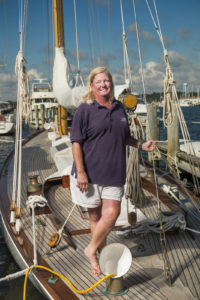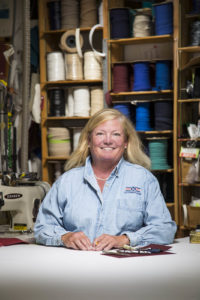 Incoming IFAI board chair Katie Bradford takes the helm, using business expertise and networking know-how to lead the association.
Incoming IFAI board chair Katie Bradford takes the helm, using business expertise and networking know-how to lead the association.
“I believe good leadership encourages participation and embraces differences,” says Katie Bradford, MFC, IFM, incoming chair of the Industrial Fabrics Association International (IFAI) and owner and president of Custom Marine Canvas, Noank, Conn. “IFAI membership is made up of large businesses, small businesses, manufacturers and suppliers. Everybody at the table has a voice—and an opportunity to impact the future of the specialty fabrics industry.”
Bradford’s introduction to small business ownership began in 1985 when she launched her marine canvas manufacturing shop in an unheated warehouse, with her one and only employee—her cousin (see “Bradford brings virtual vision to life” in the September 2009 issue). A lot has changed since then. Custom Marine Canvas is still a small business with six on staff, including Bradford, but the accommodations have improved dramatically, and the company client list now includes the U.S. Coast Guard, the U.S. Navy, the Thames Shipyard and Repair Co. and the Newport Shipyard.
Active optimism
Like many manufacturers, Bradford is still navigating her business through the economic challenges that began in 2008. “The downturn in the economy has led to a downturn in the manufacture of boats and the number of people using them,” she says. “We just don’t have the backlog of projects that we used to, but we’ve found ways to fill the gaps.”
Although doing work for the U.S. Coast Guard is nothing new for Bradford, expansion to working for the U.S. Navy is. And working for the shipyards has resulted in work from unexpected sources. “The work we do for the Newport Shipyard is on yachts. What we do for the Navy and the Thames Shipyard is heavy-duty, utilitarian stuff. The Thames Shipyard hauls out the fire boats that belong to New York,” she says. “It’s fun work, and a bonus is that one of the firefighters on board the fire boat came all the way from New York to us to have work done on his personal boat because he liked the work we did.”
Bradford is also taking on more hospitality projects for hotels and high-end homes to augment the company’s project load. “A cushion for a couch vs. a cushion for a boat is still a cushion,” she says.
 And Bradford began advertising, which she says she never had to do before. The company places ads in a local sailing magazine, as well as sending repair ads to her client list through Constant Contact. “We just started doing the email blasts in the beginning of 2015 and it’s been effective,” Bradford says. “The first one we sent out was on a Friday, and when we came in on Monday there were three calls for work waiting for us.”
And Bradford began advertising, which she says she never had to do before. The company places ads in a local sailing magazine, as well as sending repair ads to her client list through Constant Contact. “We just started doing the email blasts in the beginning of 2015 and it’s been effective,” Bradford says. “The first one we sent out was on a Friday, and when we came in on Monday there were three calls for work waiting for us.”
Despite the recent economic challenges, Bradford’s business is doing well and she is optimistic about the industry as she takes the helm of the IFAI board. In her first years of being in business Bradford became involved with Marine Fabricators Association (MFA), which led to participating on the IFAI board, both decisions she says helped her run and reinvent her business—and now she’s in a position to give back as chair of the IFAI board.
“The captains of industry all had to start somewhere. Thirty years ago I was just a kid with a sewing machine in a leaky old shed thinking, ‘I’m never going to make it.’ But I did,” she says. “I want those starting out to know they can make it too.”
What do you think is the most pressing issue for the industry?
Without a doubt, online ordering capabilities. For example, just a few years ago if a client wanted a shade sail installed, manufacturers had to go to the job site, measure it and build a custom product. Now clients can order a shade sail online, without knowing anything about relative quality and the structure needed to support it—but it’s cheaper, so a lot of people go that route. I see it as being a threat in all aspects of the specialty fabrics industry: automotive, awnings, truck covers, upholstery and more.
In response to that reality, it’s important for all of us in the custom manufacturing sector to capitalize on the custom aspect of what we do. We need to define that what we can provide to the customer is far and above what they can get prefabricated. It’s going to take a lot more work on our part to sell our products.
How can more people be involved in shaping the industry?
First, anything people can do to keep their eye on the ball and stay up on trends as they occur is helpful. A good way to do that is to be involved in IFAI at a division level. Attend all the conferences and workshops to stay current with new techniques and tools. One of our MFA members’ favorite things is the Tools, Tips and Tricks session we offer at the annual Marine Fabricators Conference. Everybody who attends brings a gadget they found or shares a technique they’ve developed that makes their jobs easier. It’s one of the best things about our trade association—how free-flowing the information is and how we all show up to help each other be successful.
What do you envision IFAI’s role to be in addressing that challenge?
We have to work to educate ourselves and our customers, to stay current on the trends in new products and processes. I’m seeing progress in how IFAI communicates every time the board gets together. It has been working hard to maximize its Web presence. I took my first IFAI webinar in August this year. It was an overview of the Defense Logistics Agency-sponsored MUST (Military Uniform System Technology) program and its capabilities.
Are there ways IFAI is involved in affecting U.S. policies that affect the industry?
Many of our divisions are involved in lobbying efforts in Washington, D.C., particularly the Geosynthetic Materials Association (GMA), United States Industrial Fabrics Institute (USIFI) and Narrow Fabrics Institute (NFI).
I had the opportunity to attend the Spring Lobby Days in April 2014. It was a learning experience for me to see how things work on Capitol Hill. We sat in on the Senate proceedings in the Senate Gallery, attended appropriate committee meetings and had appointments with various committees to talk about industry issues. I appreciate the accessibility we have to our government leaders. However, it can be an expensive endeavor, so it only makes sense to lobby certain issues.
What are your thoughts on how to find and retain a skilled workforce?
I've had several interns work for me. People get to know me through the Marine Fabricators Association (MFA) and like what I've done and ask to work with me. I've had five people come and stay with me over the years and I've actually put them up in my house. They work with us for a couple of weeks and they've all gone on and created their own successful businesses.
The other thing IFAI is doing to address this issue is through the Makers Division. It's still a work in process, but through it we're working to build the sewing and manufacturing workforce through a partnership with the Makers Coalition Foundation. Members will have the opportunity to shape training curricula in their regions and find trained, certified employees to build their businesses.
 TEXTILES.ORG
TEXTILES.ORG


